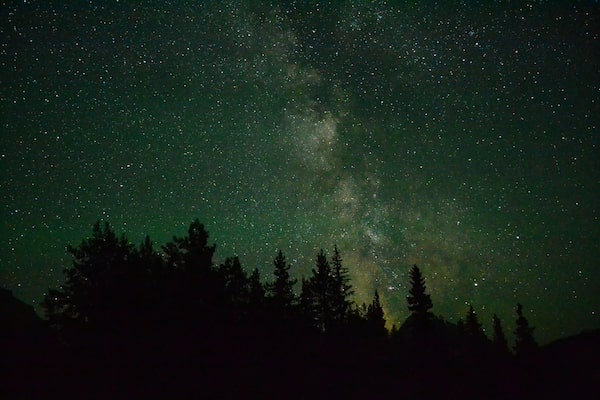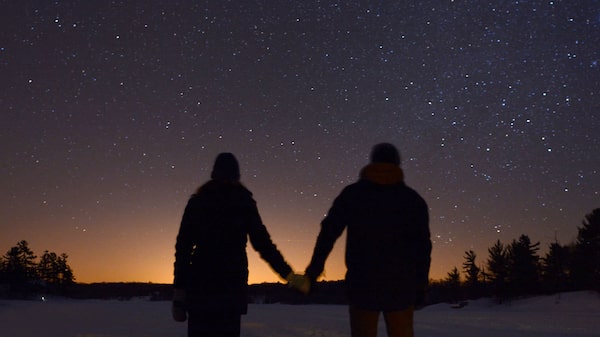Stargazers have plenty to be merry about this holiday season.
Soon after the peak of the annual Geminids meteor shower on Dec. 13 and 14, a celestial body known as 46P/Wirtanen will make one of the closest approaches to Earth of any comet in modern history. Expected to be the brightest object of its kind until 2038, Wirtanen should be easily visible to the unaided eye on and around Dec. 16.
This coincides nicely with the longest night of the year on Dec. 21 – the waxing moon notwithstanding – while the new moon of Jan. 5 will provide prime viewing conditions for other astronomical wonders, such as the Quadrantid meteor shower and, if you’re lucky, the aurora borealis.
Of course, urban light pollution can make it difficult to enjoy the viewing experience. Here, then, are seven dark-sky destinations across Canada – from Jasper’s new planetarium to Muskoka’s granite hills – for travellers who want to make like those three kings of yore and follow the stars more closely.
Jasper Planetarium, Alberta

On a purpose-built Sky Plateau at the Jasper Planetarium, guests can observe the cosmos through what's said to be the largest telescope in the North American Rockies.logan parratt/Flickr
Three years after first inflating a 35-seat planetarium on Connaught Drive, this astronomical attraction is migrating to the festively festooned grounds of the Fairmont Jasper Park Lodge for the winter.
Starting Dec. 13, its newly enlarged steel-framed dome will host astronomer-narrated multimedia tours of the surrounding national park – the world’s second-largest dark-sky preserve – for up to 50 guests at a time. Outside on the Fairmont’s purpose-built “Sky Plateau,” guests can then observe the cosmos through what’s said to be the largest telescope in the North American Rockies, watch replays of recent astronomical events using a new video telescope and warm up with s’mores and hot chocolate around a campfire. Resort guests can add these diversions onto their bookings.
On the evenings of Dec. 13 and 14, meanwhile, planetarium general manager Peter McMahon and his staff will use every available resource to help guests admire the Geminids meteor shower, which has recently produced as many as 160 shooting stars an hour. No auroras? No comets? No problem.
Torrance Barrens Dark-Sky Preserve, Ontario

Torrance Barrens Dark-Sky Preserve is open 24 hours a day year-round.Torrance Barrens Dark-Sky Preserve
A two-hour drive north of Toronto, Canada’s first dark-sky preserve encompasses 4,700 acres of low granite outcroppings, lakes, ponds and wetlands surrounded by stunted trees and bushes. The former are ideal for panoramic views of the night sky any time of year, while the watery sections become more accessible after they freeze over.
The preserve is open 24 hours a day year-round, admission is free and there are three well-marked snowshoe trails available to headlamp-wearing winter stargazers who park in the main lot off Southwood Road.
Aurora Village, Yellowknife
So many visitors come to the Northwest Territories in winter to admire the Northern Lights that Yellowknife hotels issue daily “Probability of Aurora” reports. Weather bulletins, meanwhile, tend to predict extremely cold temperatures, and that’s where the Aurora Village comes in.
A short drive west of town, the sprawling complex of hilltop viewing platforms and lantern-lit pathways keeps guests warm with woodstove-heated teepees, parka rentals and heated stargazing pods built for two.
Au Diable Vert, Quebec
Even with “the world’s first open-air augmented-reality planetarium” closed for the winter – as National Geographic calls the new ObservEtoiles amphitheatre – the surrounding Au Diable Vert nature resort still makes the most of its new dark-sky preserve status.
The expansive patio attached to the check-in chalet provides superb views over the Eastern Townships’ rolling hills, while the 30-acre central pasture is lined with leaf-shaped sleeping pods and cabins perched atop trees and cliffs. These rustic accommodations also deliver sublime south-facing views, with one pod, the Caribou, offering full overhead panoramas from amid a cluster of trees in the middle of the pasture.
Northern Lights Resort & Spa, Whitehorse
Guests who want to continue stargazing after exiting this upscale wilderness resort’s outdoor hot tub can head straight for one of three new “Aurora Glass Chalets.” Featuring floor-to-ceiling wraparound windows at the foot of queen-size beds, the ensuite chalets are also fitted with in-floor heating, kitchenettes and wood-burning fireplaces.
For something more active, the four-day “Best Value Aurora Viewing” tour from Whitehorse-based Arctic Range Adventure combines soaks in the Takhini Hotsprings and visits to the Yukon Wildlife Preserve with evenings at the AuroraCentre, where guests can scan the skies and warm up with hot beverages in an insulated yurt.
After the holidays, another local aurora venture is ready to take off. Literally: The Aurora 360 Experience, which debuted late last year, is slated to provide Northern Lights viewing from a private-chartered 737 jet between Feb. 8 and 11, 2019.
Fundy National Park, New Brunswick
Of the 10 Canadian national parks that are recognized as dark-sky preserves by the Royal Astronomical Society of Canada, only Fundy is home to yurt accommodations in winter. This is a boon for camping-averse stargazers because the circular tent-like dwellings are insulated and heated with propane fireplaces, furnished with beds, chairs and tables, and all four are just five minutes by car from Fundy’s main stargazing site in the Chignecto campground. One of the yurts even accommodates pets, in case Fido feels like howling at the moon.
Blachford Lake Lodge, Northwest Territories

At Blachford Lake Lodge, Northwest Territories, guests can also cross-country ski and soak in an outdoor hot tub.
From the holidays through to April, the small planes that transport guests to this lakeside lodge 80 kilometres east of Yellowknife must trade their floats for skis. The luxurious property, however, doesn’t have to change much to offer its “Ultimate Aurora” package, which is part of Destination Canada’s “Signature Experiences” collection. Whether guests are cross-country skiing across the lodge’s namesake lake, soaking in the outdoor hot tub or taking a time out in what’s said to be the world’s first skylight-equipped “Aurora Comfort Station,” the pristine frozen lakescape and aurora-filled skies require no embellishment.
The writer has visited most of the destinations as a guest. They did not review or approve the article.